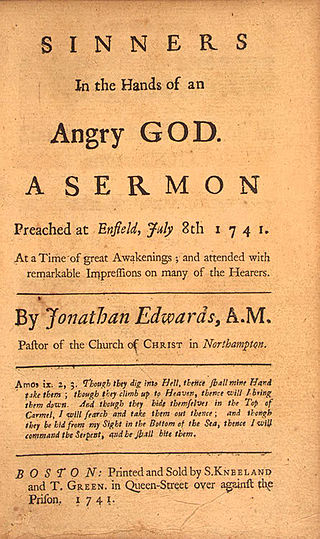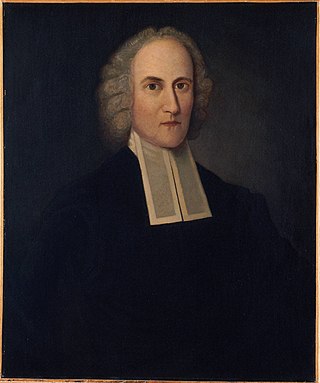To be born again, or to experience the new birth, is a phrase, particularly in evangelicalism, that refers to a "spiritual rebirth", or a regeneration of the human spirit. In contrast to one's physical birth, being "born again" is distinctly and separately caused by the operation of the Holy Spirit, and it occurs when one is baptized in water. It is a core doctrine of the denominations of the Anabaptist, Moravian, Methodist, Baptist, Plymouth Brethren and Pentecostal Churches along with all other evangelical Christian denominations. All of these Churches strongly believe Jesus's words in the Gospels: "You must be born again before you can see, or enter, the Kingdom of Heaven". Their doctrines also mandate that to be both "born again" and "saved", one must have a personal and intimate relationship with Jesus Christ.

"Sinners in the Hands of an Angry God" is a sermon written by the American theologian Jonathan Edwards, preached to his own congregation in Northampton, Massachusetts, to profound effect, and again on July 8, 1741 in Enfield, Connecticut. The preaching of this sermon was the catalyst for the First Great Awakening. Like Edwards' other works, it combines vivid imagery of sinners' everlasting torment in the burning fires of Hell with observations of the world and citations of Biblical scripture. It is Edwards' most famous written work, and a fitting representation of his preaching style. It is widely studied by Christians and historians, providing a glimpse into the theology of the First Great Awakening of c. 1730–1755.

Jonathan Edwards was an American revivalist preacher, philosopher, and Congregationalist theologian.
Solomon Stoddard was the pastor of the Congregationalist Church in Northampton, Massachusetts Bay Colony. He succeeded Rev. Eleazer Mather, and later married his widow around 1670. Stoddard significantly liberalized church policy while promoting more power for the clergy, decrying drinking and extravagance, and urging the preaching of hellfire and the Judgment. The major religious leader of what was then the frontier, he was known as the "Puritan Pope of the Connecticut River valley" and was concerned with the lives of second-generation Puritans. The well-known theologian Jonathan Edwards (1703–1758) was his grandson, the son of Solomon's daughter, Esther Stoddard Edwards. Stoddard was the first librarian at Harvard University and the first person in American history known by that title.

In Christianity, salvation is the saving of human beings from sin and its consequences—which include death and separation from God—by Christ's death and resurrection, and the justification entailed by this salvation.

The fall of man, the fall of Adam, or simply the Fall, is a term used in Christianity to describe the transition of the first man and woman from a state of innocent obedience to God to a state of guilty disobedience. The doctrine of the Fall comes from a biblical interpretation of Genesis, chapters 1–3. At first, Adam and Eve lived with God in the Garden of Eden, but the serpent tempted them into eating the fruit from the tree of knowledge of good and evil, which God had forbidden. After doing so, they became ashamed of their nakedness and God expelled them from the Garden to prevent them from eating the fruit of the tree of life and becoming immortal.

The First Great Awakening or the Evangelical Revival was a series of Christian revivals that swept Britain and its thirteen North American colonies in the 1730s and 1740s. The revival movement permanently affected Protestantism as adherents strove to renew individual piety and religious devotion. The Great Awakening marked the emergence of Anglo-American evangelicalism as a trans-denominational movement within the Protestant churches. In the United States, the term Great Awakening is most often used, while in the United Kingdom, the movement is referred to as the Evangelical Revival.
Christocentrism is a doctrinal term within Christianity, describing theological positions that focus on Jesus Christ, the second person of the Christian Trinity, in relation to the Godhead/God the Father (theocentric) or the Holy Spirit (pneumocentric). Christocentric theologies make Christ the central theme about which all other theological positions/doctrines are oriented.

The Half-Way Covenant was a form of partial church membership adopted by the Congregational churches of colonial New England in the 1660s. The Puritan-controlled Congregational churches required evidence of a personal conversion experience before granting church membership and the right to have one's children baptized. Conversion experiences were less common among second-generation colonists, and this became an issue when these unconverted adults had children of their own who were ineligible for baptism.
The terms Old Lights and New Lights are used in Protestant Christian circles to distinguish between two groups who were initially the same, but have come to a disagreement. These terms originated in the early 18th century from a split in theological approach among Calvinist denominations concerning the nature of conversion and salvation. Since then, they have been applied in a wide variety of ways, and the meaning must be determined from each context. Typically, if a denomination is changing, and some refuse to change, and the denomination splits, those who did not change are referred to as the "Old Lights" and the ones who changed are referred to as the "New Lights".
John Jea was an African-American writer, preacher, abolitionist and sailor, best known for his 1811 autobiography The Life, History, and Unparalleled Sufferings of John Jea, the African Preacher. Jea was enslaved from a young age, and after gaining his freedom in the 1790s, he traveled and preached widely.

New England theology designates a school of theology which grew up among the Congregationalists of New England, originating in the year 1732, when Jonathan Edwards began his constructive theological work, culminating a little before the American Civil War, declining afterwards, and rapidly disappearing after the year 1880.
Repentance is a stage in Christian salvation where the believer acknowledges and turns away from sin. As a distinct stage in the ordo salutis its position is disputed, with some theological traditions arguing it occurs prior to faith and the Reformed theological tradition arguing it occurs after faith. In Catholic theology, Lutheran theology, Orthodox theology and Anglican theology, repentance plays a key role in Confession and Absolution.
A Treatise Concerning Religious Affections is a publication written in 1746 by Jonathan Edwards describing his philosophy about the process of Christian conversion in Northampton, Massachusetts, during the First Great Awakening, which emanated from Edwards' congregation starting in 1734.
John Guyse (1680-1761) was an English independent minister.
Preparationism is the view in Christian theology that unregenerate people can take steps in preparation for conversion, and should be exhorted to do so. Preparationism advocates a series of things that people need to do before they come to believe in Jesus Christ, such as reading the Bible, attending worship, listening to sermons, and praying for the gift of the Holy Spirit. By making use of these means of grace, a "person seeking conversion might dispose himself toward receiving God's grace."
Abigail Hutchinson can refer to:
The Revival of 1800, also known as the Red River Revival, was a series of evangelical Christian meetings which began in Logan County, Kentucky. These ignited the subsequent events and influenced several of the leaders of the Second Great Awakening. The events represented a transition from British traditions to innovations arising from the unique needs and culture of Americans in the new century, especially on the frontier. The startling manifestations of revival fervor that first occurred in June 1800 at the Red River Meeting House, a small Presbyterian congregation led by James McGready, began as a Scottish sacrament service, but led to the important innovation of serial religious services later known as camp meetings.

Congregationalism in the United States consists of Protestant churches in the Reformed tradition that have a congregational form of church government and trace their origins mainly to Puritan settlers of colonial New England. Congregational churches in other parts of the world are often related to these in the United States due to American missionary activities.

Sarah Edwards was an American missionary and the wife of theologian Jonathan Edwards. Her husband was initially drawn to her spiritual openness, direct relationship with God, and periods of spiritual ecstasy. As a theological student at Yale, he had longed to have a personal relationship with God. His wife's experiences, similar to those of Saint Teresa of Ávila, profoundly affected his religious life and the formation of the New Light. She was a model of spirituality during the Great Awakening of the early 18th century. Her experiences of religious ecstasy were documented in Jonathan Edwards's work, Some Thoughts Concerning the Present Revival of Religion in New England. She was a Puritan who took her faith very seriously. She raised her eleven children, largely by herself, as Jonathan Edwards focused on sermons and books. Among her noted descendants, Sarah was the grandmother of U.S. vice president Aaron Burr.








